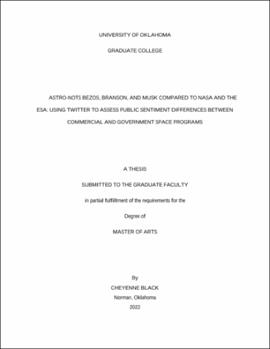| dc.description.abstract | In recent years, the endeavors of commercial entities in space travel have increased dramatically outside of government contracts. What was traditionally a granted contract system with NASA, has now become the “New Age Space Race” or “Billionaire Space Race”. This has subverted previously held norms of how private entities participate in space exploration. Billionaires, i.e. Jeff Bezos, Richard Branson, and Elon Musk, have, and are, increasingly funding their own private programs and missions in space. As the polarization between traditional government space exploration and private entities’ engagement in space increases, there is a notable difference in public perceptions towards these two groups. My thesis uses an international scope to examine how sentiments expressed towards commercial entities engaged in space exploration differ in comparison to American and European space programs. Further, this study expands Jones and McBeth’s Narrative Policy Framework (NPF) by using text and sentiment analysis of Twitter data to build space policy narratives. In turn, these can be used to assess how policy outcomes influence policy narratives and public opinion. Finally, a discussion of future directions in space policy research and understanding narratives towards commercial and government space programs is presented.
KEYWORDS: space policy, Narrative Policy Framework, text analysis, sentiment analysis, Twitter, Elon Musk, NASA, Blue Origin, SpaceX, public opinion | en_US |

